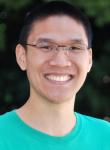Ong, Joseph

Joseph is a graduate student in the Biochemistry, Molecular and Structural Biology Program. He received a B.S. degree from the University of Notre Dame in 2016, and then came to UCLA and joined the laboratory of Dr. Jorge Torres. He entered the CMB Training Program in 2017.
Mentor: Dr. Jorge Torres
Cell processes like growth and division are tightly regulated. One such mechanism of regulation is ubiquitination. Ubiquitination can change a protein’s localization or activity, or it can mark the protein for degradation by the ubiquitination proteasome system. The final step of ubiquitination is mediated by E3 ligases. An E3 ligase will bring together the ubiquitin to be transferred and the protein to be ubiquitinated. As such, E3 ligases and their substrate adaptors, proteins that allow E3 ligases to be more selective when choosing their targets, play an important role in modulating protein activity and controlling protein turnover.
Cul7 is an E3 ligase that has been shown to play an increasingly important role in the cell. Originally discovered for its interaction with p53, Cul7 has been implicated in cell division: knockdown of Cul7 via siRNA leads to abnormal microtubule dynamics and polyploidy. To elucidate the mechanism by which Cul7 causes these phenotypes, I'm interested in analyzing Cul7's binding partners and substrates. In particular, Cul7 has only been shown to bind to one substrate adaptor, F-box protein Fbxw8. Whether or not Cul7 can bind to other F-box proteins has not yet been determined. I plan to use in vitro binding assays to identify Cul7's other F-box proteins, if any. I also plan to purify Cul7 complexes from human cell lines and perform mass spectrometry-based analyses in order to identify binding partners and potential substrates, which can be further validated via in vitro binding and ubiquitination reactions and characterized via microscopy. These studies will increase our understanding of Cul7’s role in cell division.


